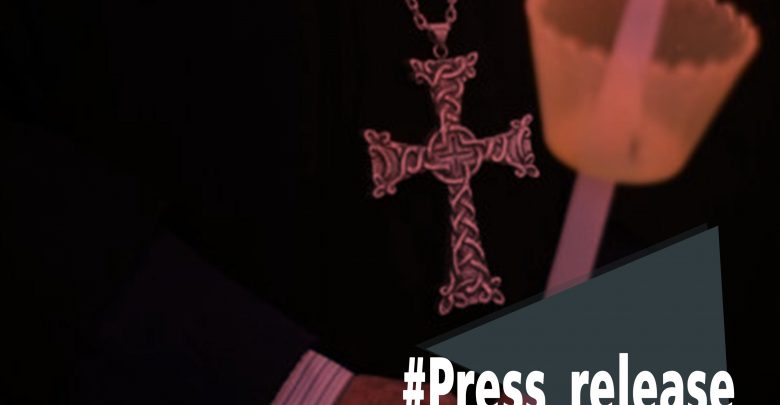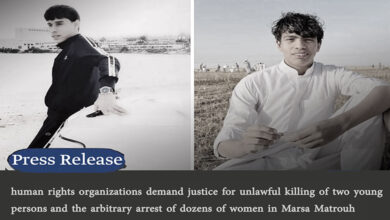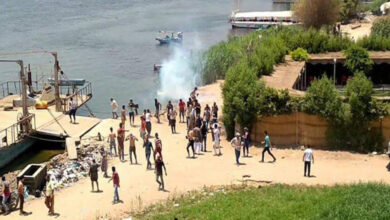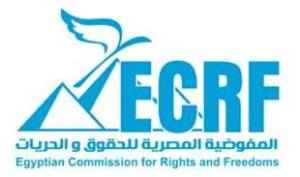The Murder of Seven Christians at the Church of St. Samuel the Confessor Confirms the Continued Weakness of Al- Sisi government at Protecting Christian citizens

November 4th 2018,
The Egyptian Commission for Rights and Freedoms (ECRF) strongly condemns the terrorist act targeting Christian citizens on Friday, Nov. 2nd 2018 in the vicinity of the monastery of St. Samuel the Confessor in Menia, which confirms the contempt of those who perpetrated this act, whether individuals or groups, to the value of life and the sanctity of the human soul.
This criminal act has nailed the lives of seven people, including six members of the same family, the Yusuf Shehata family, where three of his sons; Kamal, Reda and Nadi Youssef Shehata were killed together with three of his grandchildren; Bishoy Reda, Maria Kamal and Bossi Milad Youssef Shehata, while the seventh was Assaad Farouk Labib Ghali – others were injured as they were on buses on an unpaved road between the monastery and Menia.
ECRF also condemns the continued failure of the Egyptian authorities in protecting the lives of Egyptian citizens in incidents targeting Christians that has already happened in the same pattern and in the same place last year.
Providing the necessary protection for Christian citizens, so that they can practice their religious beliefs freely and safely, requires the Egyptian government to take more serious and effective policies and procedures in terms of securing the lives of citizens, especially Christians, to ensure the exercise of their religious beliefs, and the freedom to visit their holy sites from churches and monasteries. Among these measures are securing of religious trips, securing, paving and lighting the roads leading to monasteries and places of worship, providing emergency services, and ensuring that their communication networks are covered.
ECRF also demands judicial and executive powers, to turn those responsible for the security failure, which has put the lives of citizens at risk, for an urgent and transparent investigation of the shortcomings and accountability of those responsible.
ECRF points out that since Abdel Fattah al-Sisi took over as President of the Republic, the situation of Christians continued to degrade from bad to worse, between sectarian attacks on churches, homes and properties, and terrorist operations targeting many churches and individuals.
Despite the keenness of President Sisi to maintain a close relationship with Pope Tawadros II of Alexandria, Pope of Alexandria and Patriarch of St. Mark, and courting the votes of Christian voters on more than one occasion, however, the facts indicate a lack of seriousness and effectiveness in following up the policies and procedures that protect the rights of Christians in the freedom of belief and the promotion of their security and safety.
ECRF has managed to document and monitor at least, 31 incidents of sectarian violence, under the ruling of President Sisi since him taking office in June 2014 to date, in which there were mass attacks on Christian homes and private properties, by some of the Muslims of villages.
The reactions of the Egyptian authorities in most of these incidents, with limited exceptions, were resorting to customary solutions and the absence of law enforcement and the impunity of perpetrators.
ECRF has also been able to document and monitor 16 incidents, in which Christians were prevented from exercising their religious beliefs by the security authorities, on the grounds that there were no licenses for prayer, or bowing to the demands of some extremists in the villages who demanded not to allow Christians to pray, following the promulgation of the new church building law in September 2016.
ECRF also monitored four other attacks in which five Christians were killed by extremists.
With regard to incidents in which terrorist groups targeted Christians, ECRF has monitored 10 terrorist incidents since President Sisi took over, where at least 114 Christians were killed in those incidents, including targeting and killing eight Christians from El Arish in early 2017, which resulted in enforced displacement of Christian citizens from the city of El Arish in Northern Sinai, in an incident that was the first of its kind in modern history.
ECRF points out that those statistics are what its researchers have been able to monitor or document, and verify the validity of its occurrence and the details of its events and consequences, and that they do not necessarily represent the complete inventory including all the events that took place during that period, but only those events in which we have been able to obtain reliable information on.
In all the events monitored or documented by ECRF, it was clearly noted that there was absence of a serious and effective policy of President Sisi’s governments to stop or prevent the recurrence of such patterns of accidents, and to provide the necessary protection for Christians to practice their religious rites and visit their holy sites. On the contrary, the incident targeting Christians in the vicinity of the monastery of St. Samuel the Confessor for the second time, in the same style and in the same place, proves how the security authorities ignore their essential role of protecting citizens and preserving their lives. Also, the repetition of incidents of sectarian violence shows a similar pattern, of the absence of true desire or competence required to prevent these events from recurring. In fact, they rather show the inflexibility and indigence in the implementation of the Law on the Construction of Churches, and the delay in its application in a way that detracts from the right of Christians to pray and establish places of worship.
ECRF asserts that the policies of the Egyptian government, since Al-Sisi took over, in dealing with the majority of those facts, represent a serious breach of Egypt’s constitutional obligations, to protect the rights of Christian citizens to a safe life, according to Article 59 of the Egyptian Constitution, as well as the right to freedom of religion and belief and the exercise of religious rites, accordance to Article 64 of the Egyptian Constitution.
ECRF reminds the government of President Abdel Fattah Al-Sisi of its international obligations to the right to freedom of belief, conscience and religion, in accordance with article 18 of the International Covenant on Civil and Political Rights of 1966.





